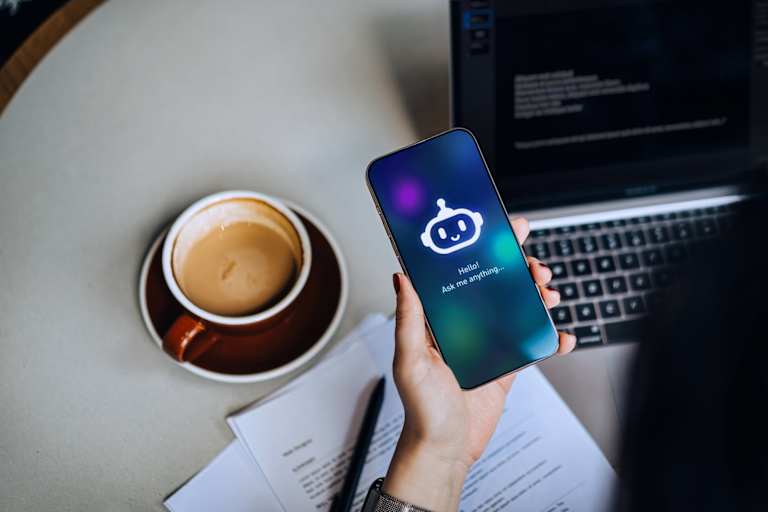Is the Use of AI Changing the Way We Think About Thinking?
- Using chatbots, ChatGPT, and other forms of AI changes how we think, affecting our decision-making and critical thinking skills.
- Research shows that AI tools reduce our mental load, which can negatively impact our ability to think.
- Investigating the link between metacognition and AI reveals AI’s advantages and drawbacks and what we can do about them.
Artificial intelligence is a powerful tool. Chatbots offer a convenient, fast way to get information, virtual assistants help us streamline tasks, and generative AI can create new content almost instantly.
But is AI changing the way we think?
The use of AI influences metacognition, or how we think about thinking. While using AI has both benefits and disadvantages, research shows that this new technology is having an impact.
Meet Our Contributor
- Tomika Chappell, Psy.D., CCC-SLP, CBIS, is a dual speech-language pathologist and psychologist with training in developmental assessment and brain injury rehabilitation from the neck up.
Metacognition Explained
Psychologists describe metacognition as our self-awareness about how we think. Those with metacognitive awareness understand their thought processes and how they learn best. They’re also aware of how they make decisions and solve problems.
“As artificial intelligence serves as a growing influence producing significant and irreversible change, the way we think about thinking is bound to evolution,” said Tomika Chappell, Psy.D., CCC-SLP, CBIS.
Metacognition influences critical thinking, focus, and self-regulation. And research shows that AI is already impacting metacognition.
The Impacts of AI on Metacognition
Proponents of AI see its relationship with metacognition as a valuable tool for automating repetitive tasks and increasing productivity. By offloading mental tasks, users can reduce their cognitive load. However, research also reveals a downside to this reliance on AI.
“Perhaps you have noticed decreased spelling capabilities from reliance on autocorrect and decreased digit span capacity from not having to recall seven-digit phone numbers,” said Dr. Chappell. “Lack of use and repetition of the tasks prevents implicit storage.Thus, we see that dependence on such tools works against development and maintenance of that skill, especially before a skill has been adequately developed.”
Dr. Chappell further explained the impact that over-reliance on AI has on metacognition.
“Cognitive impact also includes decreasing attention span and concentration, increasing attention deficit disorder behavior, increased impulsivity, and decreased time allotted to critical thinking before decision making, as has been well documented in peer-reviewed journals,” she said.
In a June 2025 study, researchers at MIT investigated brain activity while participants wrote essays using large language models (LLMs), search engines, or their brains only (no external tools).
Compared with the other groups, those who used LLMs “consistently underperformed at neural, linguistic, and behavioral levels,” according to the study.
In contrast, the participants who relied on their brains alone showed higher neural connectivity than the other groups. This group also reported higher satisfaction and more engagement. Brain activity for the search engine group aligned with the brain-only participants more than the LLM users.
“While LLMs offer immediate convenience, our findings highlight potential cognitive costs,” the researchers concluded.
A 2025 study published in Societies journal found similar results. After surveying and interviewing 666 participants, the study “revealed a significant negative correlation between frequent AI tool usage and critical thinking abilities.”
As one participant in the study put it, “It’s great to have all this information at my fingertips, but I sometimes worry that I’m not really learning or retaining anything. I rely so much on AI that I don’t think I’d know how to solve certain problems without it.”
Advantages
Virtual assistants, chatbots, generative AI, and AI-powered search engines empower users to find information, complete tasks, and make complex decisions.
Dr. Chappell sees several cognitive advantages to using AI. “AI could certainly take time off of mundane, less complicated tasks that are straightforward and increase productivity with higher-level task automation, freeing time and energy for more layered considerations,” she said.
For example, in the education system, AI gives educators the power to adapt lessons to each student’s needs and encourage greater engagement.
Dr. Chappell noted that “interactive technology such as chatbots could stimulate thought and provide grounds in which to explore and expand subsequent ideas.”
Disadvantages
While appreciating the strengths of AI, users also need to consider the trade-off.
“I find myself using AI tools for almost everything—whether it’s finding a restaurant or making a quick decision at work. It saves time,” a participant in the Societies study noted. “I do wonder if I’m losing my ability to think things through as thoroughly as I used to.”
Another participant reported, “The more I use AI, the less I feel the need to problem-solve on my own. It’s like I’m losing my ability to think critically.”
This form of AI dependence could negatively impact thinking and present false information.
“The problem is the lack of accountability from AI, as ChatGPT merely puts a disclaimer: ‘ChatGPT can make mistakes,’ at the end of [its] contribution,” said Dr. Chappell. “…people without research backgrounds tend to overly rely on AI to answer questions.”
Dr. Chappell also noted issues with how ChatGPT gathers information.
“Taking an open source’s gathering of information as fact can be costly for weighted tasks such as recalling history accurately, as factors such as not considering the source’s motives for their perspective on certain issues,” she further explained.
A Societies study participant echoed that sentiment: “I rarely reflect on the biases behind the AI recommendations; I tend to trust them outright.”
Metacognition and AI in Context
The impact of AI on how we think depends on how we use AI tools. While research studies have uncovered downsides to overrelying on AI, the technology itself can help address the problem.
Integrating critical thinking support into AI tools offers one option. For example, chatbots can encourage users to self-evaluate information. In addition, educating users on the differences between offloading menial tasks vs. complex decision-making can impact metacognition.
In short, it matters how we use AI. “I can not emphasize enough that AI should be supplemental to our thinking, not a replacement,” Dr. Chappell stressed.
For psychology students, human-AI interactions offer a rich field to explore.


